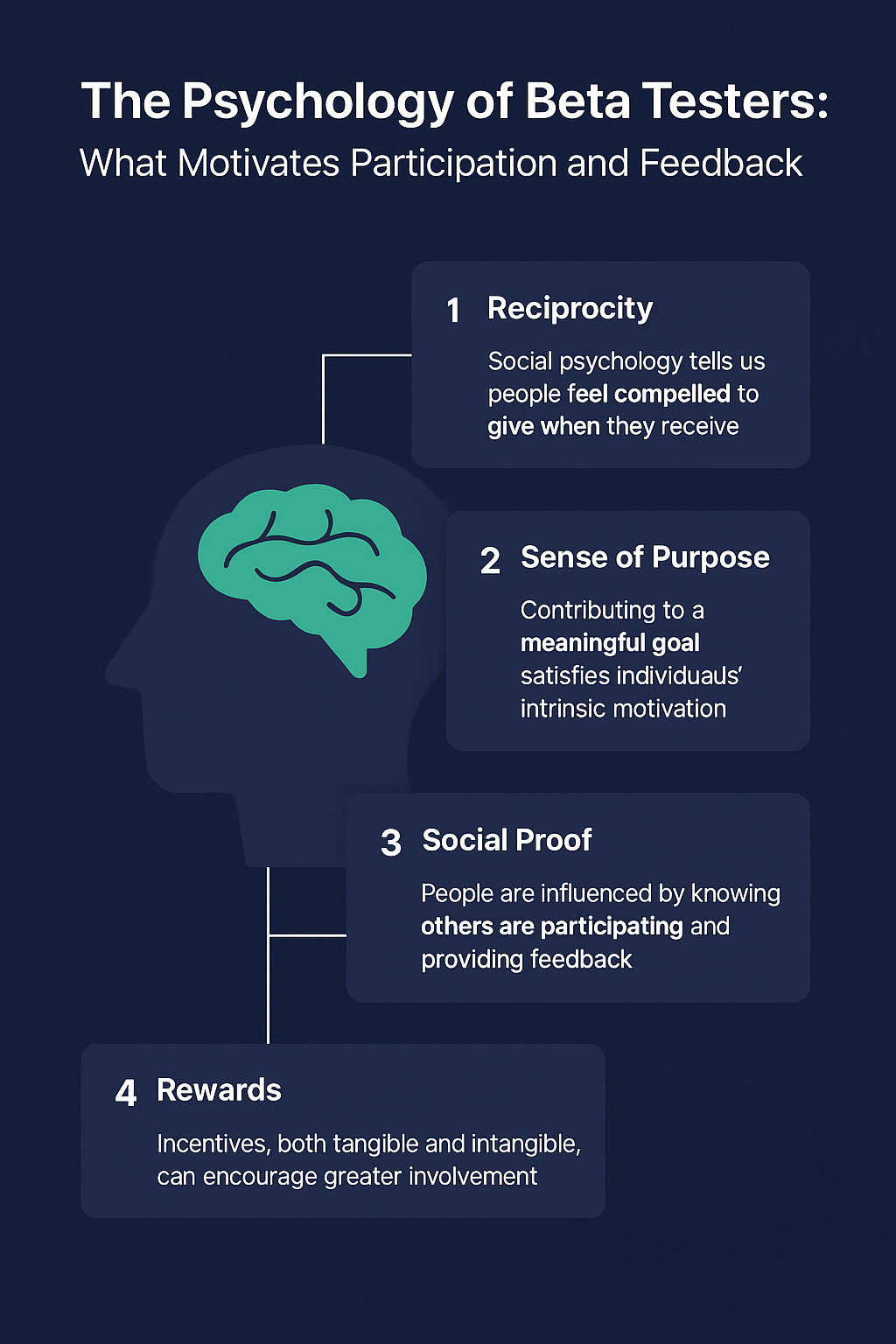Beta testers are not just users — they’re early adopters, collaborators, and a vital part of your product’s success. But if you’ve ever struggled to get testers to consistently submit feedback, or wondered why engagement trails off mid-cycle, the answer might lie not in your process — but in psychology.
In this post, we’ll break down the psychological factors that drive beta tester participation and share actionable tips for B2B product teams to build more motivating, feedback-rich beta programs.
One of the strongest motivators for participation is validation. When testers feel their input matters, they’re more likely to stay engaged(1). According to research on user engagement and motivation, people are more likely to contribute when they see that their feedback is acknowledged and acted on.
Pro Tip: Set up automated acknowledgment emails or status updates that show testers how their feedback is being used. Bonus: mention their input by name in release notes or community updates.
The Zeigarnik Effect(2) shows that people remember unfinished tasks better than completed ones — and have a drive to complete them. Apply this by turning your beta test into a clear journey with checkpoints, not a black box.
Pro Tip: Use checklists, milestones, or gamification to show testers their progress. A simple "You're 75% done" can trigger completion motivation.
Cognitive load theory(3) suggests people are more likely to engage when tasks are easy and rewarding. Long, unstructured surveys or confusing platforms can drive dropout. Give your testers simplicity and they'll reward you with quality feedback
Pro Tip: Break feedback into short, structured pieces. Use prompts, multiple-choice questions, and optional text fields. Avoid massive end-of-cycle surveys.

We learned from social psychology that people feel compelled to give when they receive(4) — a principle known as the norm of reciprocity. Something as simple as a "thank you" or a small gesture can go a long way. It doesn't need to be elaborate or expensive, but the simple gesture creates a positive psychological loop that can drive engagement.
Pro Tip: Offer small rewards — even intangible ones like exclusive feature previews, shoutouts, or digital badges. A branded exclusive swag is proven to be a big motivator in our experience.
Beta testers are more engaged when they identify with your product’s mission or your team’s vision(5). Feeling part of something larger increases commitment and satisfaction as proven by research on intrinsic motivation and belonging in the workplace.
Pro Tip: Onboard testers like insiders. Share your goals, product vision, and why their input matters. Humanize the experience.
Engagement isn’t just about reminders and incentives. It’s about psychology — helping testers feel seen, supported, and connected to a mission.
Whether you're running a one-week test or a months-long beta program, thinking like a behavioral designer can transform how much feedback you get and how valuable it is.
Want to see how Stomio helps you engage testers smarter? Request a demo today.
References:
[1]: UX Design. "The Psychology of User Engagement."
https://medium.com/@carlosrojasdev/the-psychology-of-user-engagement-47dd3dc6a977
[2]: McGraw-Hill Research. "The Zeigarnik Effect: Why Unfinished Tasks Stick in Your Mind."
https://medium.com/illumination/the-zeigarnik-effect-why-unfinished-tasks-stick-in-your-mind-58fa2df5a2b4
[3]: E-Learning Industry. "Cognitive Load Theory and Instructional Design." https://elearningindustry.com/cognitive-load-theory-and-instructional-design
[4]: National Center for Biotechnology Information. "Reciprocity and Prosocial Behavior." https://www.ncbi.nlm.nih.gov/pmc/articles/PMC3144192/
[5]: Harvard Business Review. "To Engage Employees, Give Them a Sense of Purpose." https://hbr.org/2019/12/to-engage-employees-give-them-a-sense-of-purpose
Ayham Ereksousi
Co-Founder CEO